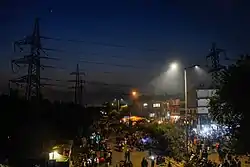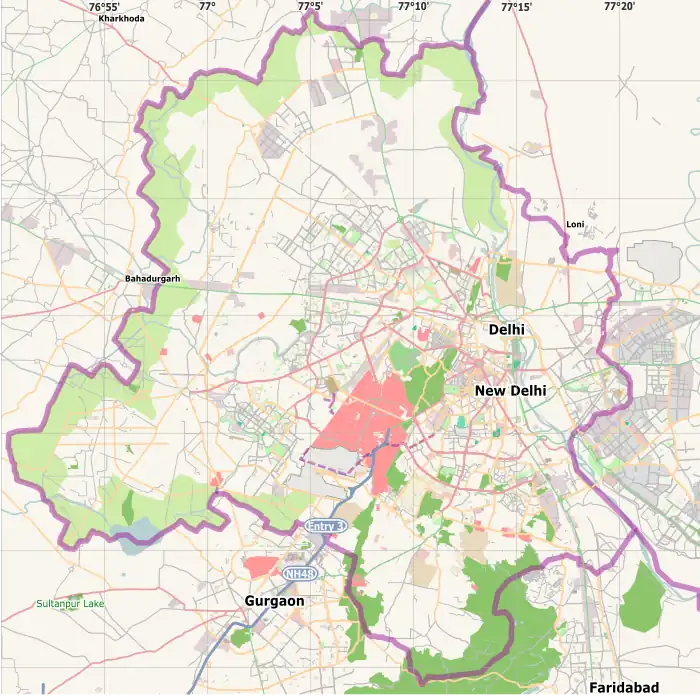Shaheen Bagh | |
|---|---|
 Shaheen Bagh at night | |
 Shaheen Bagh Location in Delhi, India | |
| Coordinates: 28°33′05″N 77°17′49″E / 28.5513°N 77.2970°E | |
| Country | India |
| State | Delhi |
| District | South Delhi |
| Languages | |
| • Official | |
| • Additional official | |
| Time zone | UTC+5:30 (IST) |
| PIN | 110025 |
| Vehicle registration | DL |
| Planning agency | South Delhi Municipal Corporation |

Shaheen Bagh is a neighbourhood in the South Delhi district of Delhi, India. It is on the U.P border and southernmost colony of the Okhla (Jamia Nagar) area, situated along the banks of the Yamuna.[2] The locality is known for being the site of gathering for the protest against the Citizenship (Amendment) Act (CAA), National Register of Citizens (NRC) and National Population Register (NPR).[3] Shaheen Bagh is recognized as one of the areas in Delhi with a significant Muslim population.
Etymology
Shaheen Bagh is named after the Shaheen falcon, with Shaheen itself being a Persian word. The name was chosen from a poem of Allama Iqbal's (Muhammad Iqbal) called Bal-e-Jibril (Gabriel's Wing).[4] The area started to be populated in the early to mid 1980s.[4]
Market
Shaheen Bagh is famous for its Mughlai foods. Most of these shops are situated on 40 Foot Road. Delhi's one of the most famous food franchises is available here, like Quraishi Chicken, Javed Famous Nahari, and Zahra Restaurant, etc.
Connectivity
This area has connectivity to nearby commercial and official areas such as Noida, Nehru Place, Sarita Vihar, Jasola, Okhla Industrial Area, Kalindi Kunj and Okhla Railway Station. It also has connectivity to universities like Jamia Millia Islamia, Jamia Hamdard, and Amity University. A metro train railway station named as Jasola Vihar Shaheen Bagh metro station connects Shaheen Bagh to the Delhi metro network. A metro train station is present in Sarita Vihar, around 1–2 km from Shaheen Bagh. Buses for major routes start from nearby Kalindi Kunj.
Protest Site
This place is widely known for the Shaheen Bagh protests held during the nation-wide movement against the CAA, NRC and NPR. The protests were mainly led by Muslim women of Shaheen Bagh in a form sit-in for more than 4 months.[5] They blocked the highway connecting Noida inspired by the call of Sharjeel Imam for 'Chakka Jam' (traffic block).[6]
References
- 1 2 "Official Language Act 2000" (PDF). Government of Delhi. 2 July 2003. Archived from the original (PDF) on 4 March 2016. Retrieved 29 January 2020.
- ↑ Lakhwani, Nikhil (8 February 2020). "After polarising campaign, Shaheen Bagh goes to vote amid heavy security". India Today. Retrieved 8 February 2020.
- ↑ Mathew, Ashlin (14 March 2020). "Protests to continue until CAA-NPR-NRC withdrawn, say Shaheen Bagh protestors, activists". National Herald. Retrieved 15 February 2021.
- 1 2 Iftikhar, Fareeha (23 January 2020). "Shaheen Bagh living up to its name, says man who christened the colony". Hindustan Times. Retrieved 24 January 2020.
- ↑ Farooqi, Farah (20 January 2020). "To better understand the Shaheen Bagh protest, we must understand the locality itself". The Caravan. Retrieved 26 January 2020.
- ↑ Faisal, Syed Mohammed (2020). "Shaheen Bagh and the hermeneutics of Muslim identity in South Asia". HAU: Journal of Ethnographic Theory. 10 (3): 767–775. doi:10.1086/712221. S2CID 229291218.